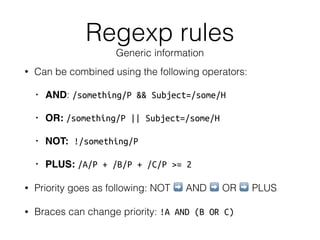Rspamd is a spam filtering system that is:
- Written in C for performance and uses an event-driven model to process messages asynchronously for scalability.
- Capable of detecting spam through a variety of filtering methods like policies, DNS lists, headers, text patterns, and machine learning.
- Integrates with mail transfer agents using plugins to modify or reject messages based on spam detection.






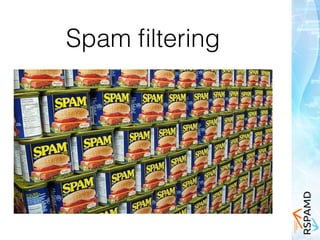







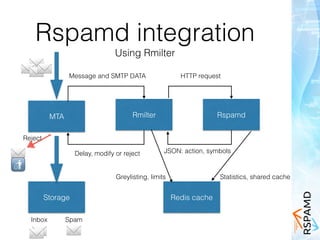

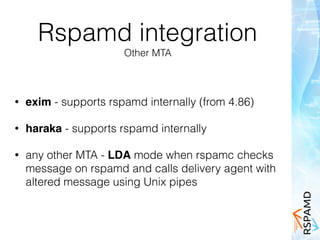







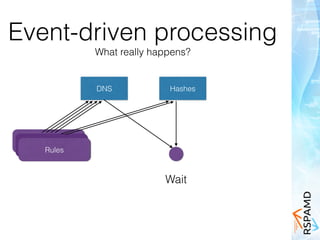

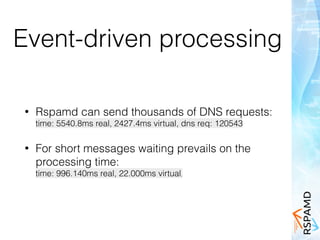
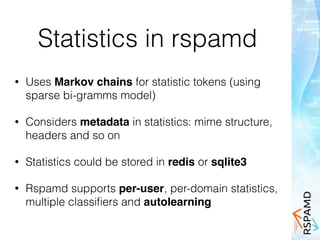

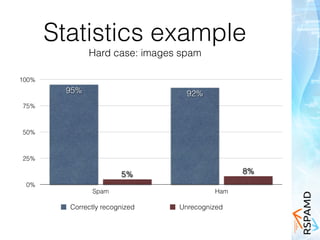








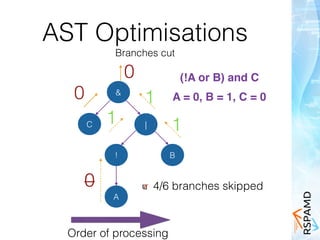








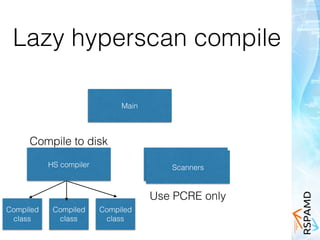







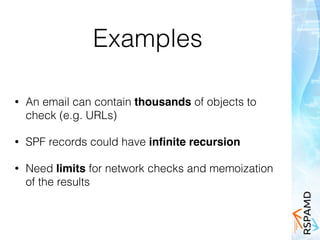
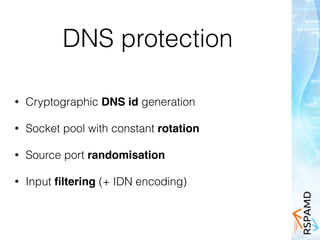




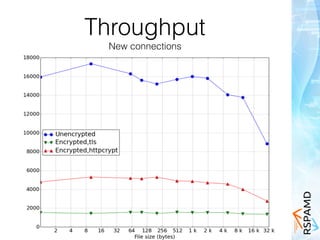
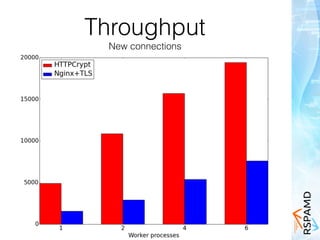


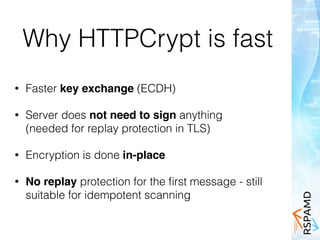







![UCL building blocks
• Sections
• Arrays
• Variables
• Macros
• Comments
section {
key = “value”;
number = 10K;
}
upstreams = [
“localhost:80”,
“example.com:8080”,
]
static_dir = “${WWWDIR}/“;
filepath = “${CURDIR}/data”;
.include “${CONFDIR}/workers.conf”
.include (glob=true,priority=2) “${CONFDIR}/conf.d/*.conf”
.lua { print(“hey!”); }
key = value; // Single line comment
/* Multiline comment
/* can also be nested */
*/](https://image.slidesharecdn.com/ae199da5-42cf-4238-bf0a-e35aac9d7b42-160202093100/85/rspamd-fosdem-74-320.jpg)


![Lua rules
Some examples
-- Outlook versions that should be excluded from summary rule
local fmo_excl_o3416 = 'X-Mailer=/^Microsoft Outlook, Build 10.0.3416$/H'
local fmo_excl_oe3790 = 'X-Mailer=/^Microsoft Outlook Express 6.00.3790.3959$/H'
-- Summary rule for forged outlook
reconf['FORGED_MUA_OUTLOOK'] = string.format('(%s | %s) & !%s & !%s & !%s',
forged_oe, forged_outlook_dollars, fmo_excl_o3416, fmo_excl_oe3790, vista_msgid)
• Regexp rule
• Lua rule
rspamd_config.R_EMPTY_IMAGE = function(task)
local tp = task:get_text_parts() -- get text parts in a message
for _,p in ipairs(tp) do -- iterate over text parts array using `ipairs`
if p:is_html() then -- if the current part is html part
local hc = p:get_html() -- we get HTML context
local len = p:get_length() -- and part's length
if len < 50 then -- if we have a part that has less than 50 bytes of text
local images = hc:get_images() -- then we check for HTML images
if images then -- if there are images
for _,i in ipairs(images) do -- then iterate over images in the part
if i['height'] + i['width'] >= 400 then -- if we have a large image
return true -- add symbol
end
end
end
end
end
end
end](https://image.slidesharecdn.com/ae199da5-42cf-4238-bf0a-e35aac9d7b42-160202093100/85/rspamd-fosdem-77-320.jpg)

![Pure LUA functions
• Variables:
• Conditionals:
• Loops:
• Tables:
• Functions:
• Closures:
local ret = false -- Generic variable
local rules = {} -- Empty table
local rspamd_logger = require “rspamd_logger" -- Load rspamd module
if not ret then -- can use ‘not’, ‘and’, ‘or’ here
…
elseif ret ~= 10 then -- note ~= for ‘not equal’ operator
end
for k,m in pairs(opts) do … end -- Iterate over keyed table a[‘key’] = value
for _,i in ipairs(images) do … end -- Iterate over array table a[1] = value
for i=1,10 do … end -- Count from 1 to 10
local options = { [1] = ‘value’, [‘key’] = 1, -- Numbers starts from 1
another_key = function(task) … end, -- Functions can be values
[2] = {} -- Other tables can be values
} -- Can have both numbers and strings as key and anything as values
local function something(task) -- Normal definition
local cb = function(data) -- Functions can be nested
…
end
end
local function gen_closure(option)
local ret = false -- Local variable
return function(task)
task:do_something(ret, option) -- Both ‘ret’ and ‘option’ are accessible here
end
end
rspamd_config.SYMBOL = gen_closure(‘some_option’)](https://image.slidesharecdn.com/ae199da5-42cf-4238-bf0a-e35aac9d7b42-160202093100/85/rspamd-fosdem-79-320.jpg)


